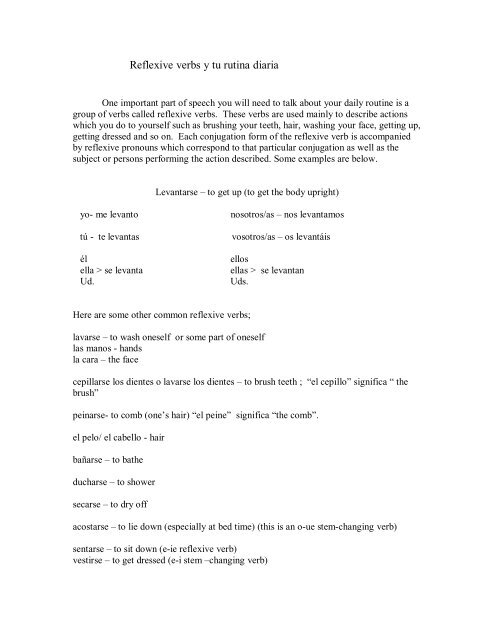Reflexive verbs y tu rutina diaria
Reflexive verbs y tu rutina diaria
Reflexive verbs y tu rutina diaria
Create successful ePaper yourself
Turn your PDF publications into a flip-book with our unique Google optimized e-Paper software.
<strong>Reflexive</strong> <strong>verbs</strong> y <strong>tu</strong> <strong>rutina</strong> <strong>diaria</strong><br />
One important part of speech you will need to talk about your daily routine is a<br />
group of <strong>verbs</strong> called reflexive <strong>verbs</strong>. These <strong>verbs</strong> are used mainly to describe actions<br />
which you do to yourself such as brushing your teeth, hair, washing your face, getting up,<br />
getting dressed and so on. Each conjugation form of the reflexive verb is accompanied<br />
by reflexive pronouns which correspond to that particular conjugation as well as the<br />
subject or persons performing the action described. Some examples are below.<br />
Levantarse – to get up (to get the body upright)<br />
yo- me levanto nosotros/as – nos levantamos<br />
tú - te levantas vosotros/as – os levantáis<br />
él ellos<br />
ella > se levanta ellas > se levantan<br />
Ud. Uds.<br />
Here are some other common reflexive <strong>verbs</strong>;<br />
lavarse – to wash oneself or some part of oneself<br />
las manos - hands<br />
la cara – the face<br />
cepillarse los dientes o lavarse los dientes – to brush teeth ; “el cepillo” significa “ the<br />
brush”<br />
peinarse- to comb (one’s hair) “el peine” significa “the comb”.<br />
el pelo/ el cabello - hair<br />
bañarse – to bathe<br />
ducharse – to shower<br />
secarse – to dry off<br />
acostarse – to lie down (especially at bed time) (this is an o-ue stem-changing verb)<br />
sentarse – to sit down (e-ie reflexive verb)<br />
vestirse – to get dressed (e-i stem –changing verb)
<strong>Reflexive</strong> <strong>verbs</strong> which are irregular - Acostarse, vestirse<br />
Acostarse vestirse<br />
yo- me acuesto nosotros/as – nos acostamos yo- me visto nosotros – nos vestimos<br />
tú te acuestas vosotros/as – os acostáis tú - te vistes vosotros – os vestís<br />
él ellos él ellos<br />
ella > se acuesta ellas> se acuestan ella > se viste ellas > se visten<br />
Ud. Uds. Ud. Uds.<br />
José y Rafa habla de su <strong>rutina</strong> <strong>diaria</strong>; escribe la forma correcta del verbo reflexivo en<br />
cada frase.<br />
José: Rafa, ¿Cómo es <strong>tu</strong> <strong>rutina</strong> <strong>diaria</strong>?<br />
Rafael: Bueno, yo (levantarse) _________ todos los días a las seis y media cuando suena<br />
el reloj despertador (when the alarm clock rings). Primero, a las siete menos<br />
cuarto (ducharse) _________, y después de ducharme , yo (secarse)<br />
____________ y (cepillarse el pelo)_________. Luego (next) (vestirse)<br />
__________ y como el desayuno a eso (around) de las siete y cuarto. Finalmente,<br />
voy a la escuela a las ocho menos cuarto.<br />
José : Normalmente yo (levantarse)_________ tarde, a las siete y media y tengo prisa (I<br />
am in a hurry) para ir a la escuela. Por eso, yo (ducharse)___________ por la<br />
noche, antes de (acostarse)_________. Mi padre y mi madre (ducharse) _______<br />
por la mañana, y yo no tengo tiempo.<br />
Rafa: Mi hermano (levantarse)________ más tarde que yo, y generalmente él no<br />
(ducharse)________ por la mañana como tú. Yo (acostarse)__________<br />
temprano(early) y él (acostarse)_________ muy tarde (late).


